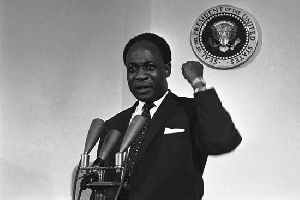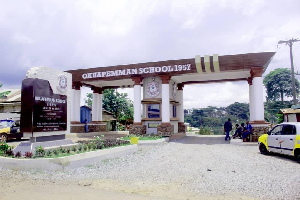- Home - News
- TWI News | TV
- Polls
- Year In Review
- News Archive
- Crime & Punishment
- Politics
- Regional
- Editorial
- Health
- Ghanaians Abroad
- Tabloid
- Africa
- Religion
- Election 2020
- Coronavirus
- News Videos | TV
- Photo Archives
- News Headlines
- Press Release
General News of Monday, 16 December 2013
Source: XYZ
Nkrumah “snubbed” Mandela in 1962 – KB Asante
Retired Diplomat K B Asante has confirmed to Radio XYZ that the Nkrumah Government, “in a way snubbed Mandela” and the African National Congress (ANC), when they were in Ghana in the 1960s to seek support against the apartheid and racist white government of that country.
Samia Nkrumah, a daughter of the pan-Africanist leader, had denied claims that her father deliberately refused to meet the late South African President during the heady days of the apartheid regime.
The late South African President, as part of his African tour to rally support for his fight against the apartheid regime, was in Ghana in 1962 with a delegation of the ANC to meet Dr Nkrumah, but never had the opportunity to do so.
Samia, who is the Convention People’s Party’s Chairperson, told TV3 that her father could not meet Mandela at the time because he had just survived an attempted assassination at Kulungugu in northern Ghana and was hospitalised.
According to her, there was no rift between her father and Mandela.
Mandela was, however, quoted by renowned Ghanaian Journalist, Cameron Duodu, in his article ‘Mandela and I’, to have said: “Ah, Ghana! I was there in 1962. I went there to see President Kwame Nkrumah. But I never got to see him. I waited for several days, but the Foreign Minister, Ako Adjei, said I would have to wait, as Nkrumah was about to address a meeting of other freedom fighters.”
According to Mandela, “So I didn’t think it would be useful to hang around in Accra and I left for Liberia. There, I was received promptly by President William Tubman!”
In the article, Cameron Duodu said: ‘I had been warned that A K Barden, director of Nkrumah’s Bureau of African Affairs, preferred the Pan-Africanist Congress to the ANC. [I later learnt that Mandela's informer was the raving beauty, Genoveva Marais, Nkrumah's very good "friend", who hailed from South Africa.]’
Nkrumah’s Government’s preference for the Pan-Africanist Congress to the ANC was confirmed by K B Asante on the XYZ Breakfast Show on Monday.
K B Asante who worked closely with Dr Nkrumah at the time, told XYZ Moro Awudu that: “…what I know is that Nkrumah’s policy, based on our intelligence reports and so on, did not favour ANC. We were then - I was the African Affairs Secretary - were supporting the Pan Africanist Congress (PAC) because they were more active; they believed in armed struggle, they were fighting for real independence for South Africa. ANC was there but we thought it was not that active”.
According to him, Nkrumah’s Government, after the Sharpville massacre on March 21, 1960, in which 69 South African students were gunned down, including 8 women and 10 children, by the apartheid Police and 180 others injured, should have reviewed its anti-ANC policy since Mandela had at the time, become a “freedom fighter” contrary to the “bourgeois” perception the Nkrumah Government had of the ANC.
“…We should have changed policy but unfortunately, the Bureau of African Affairs did not realise that things had changed; that Mandela and his group were then leading the fight, and so when he came here - in fact I wasn’t aware that he came, later I heard he came - they [Bureau of African Affairs] did not provide access”, K B Asante recalled.
He said unlike today: “…Before you saw the President those days, you had to go through the appropriate channels, and the Bureau of African Affairs did not facilitate that contact and therefore the ANC, I would say was not - even in recent years - has not been happy with Ghana…So that is true, we in a way snubbed Mandela”.
A debate started in Ghana recently about which of the two freedom fighters was greater on the Continent.
It followed US President Barack Obama’s description of Mandela as the greatest African Liberator at his memorial service in Soweto.
Mandela, who was imprisoned for 27 years by the apartheid Government, became President in 1994 after his release in 1990. He refused to go for a second term despite his huge chance of winning. He also did not retaliate against the white minority in South Africa when he was President.
Mandela was buried Sunday. He died at age 95. Hordes of world leaders thronged his memorial and burial ceremonies.
Nkrumah, who was voted as the African of the Millennium, died on April 27, 1972 in exile, Romania, after his overthrow in a 1966 coup.
He had travelled to Bucharest for skin cancer treatment from Conakry, Guinea, where he had been living after his overthrow. He was 62 years.
Nkrumah spent most his political career fighting for independence for Ghana, Africa and seeking to unite the entire African Continent.











